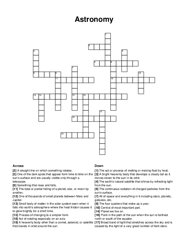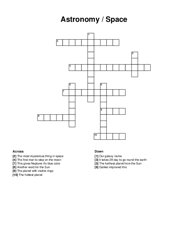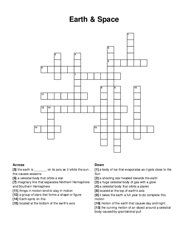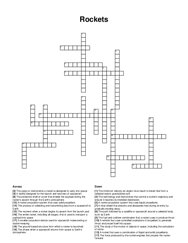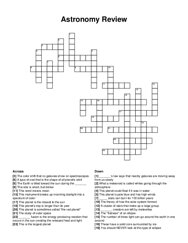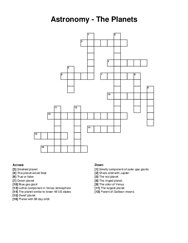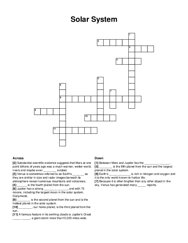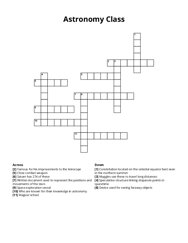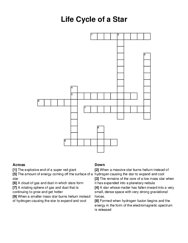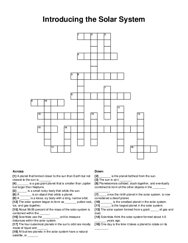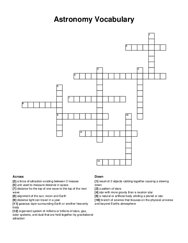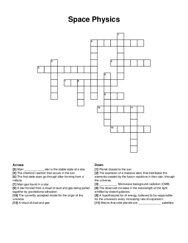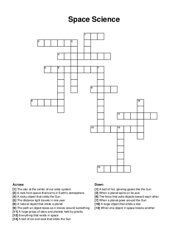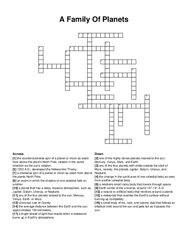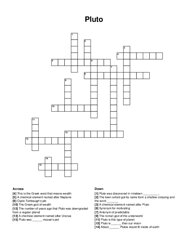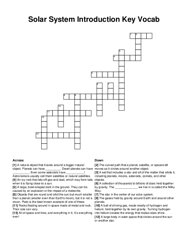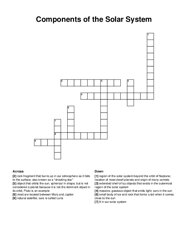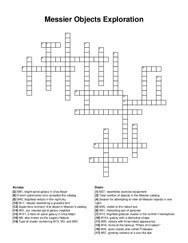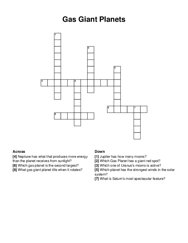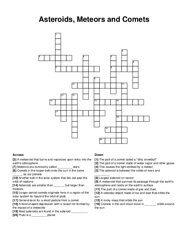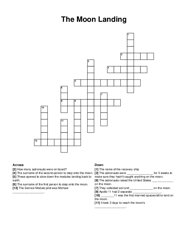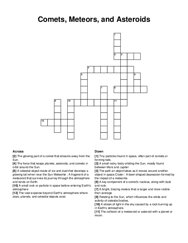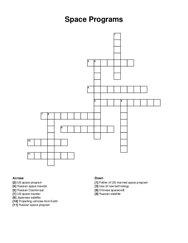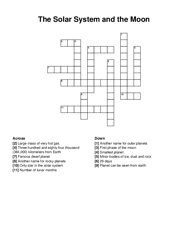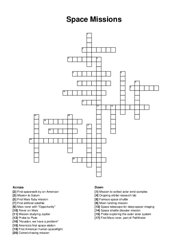Categories
- Agriculture / Farm
- Animals
- Arts / Crafts
- Beauty / Fashion
- Books / Literature
- Business / Finance
- Cities / Places
- Computers / IT
- Ecology / Climate
- Electronics
- Energy / Utilities
- Food / Drinks
- General
- Geography
- Geology
- Health / Fitness
- History
- Home / Garden
- Jobs / Education
- Kids / School
- Law / Government
- Music / Movies / TV
- News / Media
- Occasions
- Christmas
- Easter
- Halloween
- New Year
- Saint Patrick's Day
- Thanksgiving
- Valentine's Day
- Outdoors
- Religion / Belief
- Safety / Prevention
- Science
- Astronomy
- Biology
- Chemistry
- Physics
- Seasonal
- Society / Culture
- Sports
- Tools / Equipment
- Travel / Tourism
- Vehicles
Astronomy Crossword Puzzles
Free printable astronomy crossword puzzles. Download pre-made or create your own Crossword using our crossword maker. Simply download, print and start playing or play online.
You are browsing category Astronomy show all
point in the path of the sun when the sun is farthest north or south of the equator, small body of matter in the solar system seen when it falls into …
the furthest planet from the sun, our galaxy name, it takes 28 day to go round the earth, the planet with visible rings, this gives neptune it's …
things in motion tend to stay in motion, it takes the earth a full year to do complete this motion, a shooting star headed towards the earth, …
the moment when a rocket begins its ascent from the launch pad, the process of collecting and transmitting data from a spacecraft to earth, the …
_ creators are left by meteorites, this word means moon, _ 's law says that nearby galaxies are moving away from us slowly, this planet is the …
the largest planet, smallest planet, blue gas giant, home of the giant red spot, share orbit with jupiter, evening star, home of crushing atmosphere, …
earth's _ is rich in nitrogen and oxygen and it is the only world known to harbor life, _ , our home planet, is the third planet from the sun, _ …
who are known for their knowledge in astronomy, device used for seeing faraway objects, written document used to represent the positions and movements …
the explosive end of a super red giant, the amount of energy coming off the surface of a star, formed when hydrogen fusion begins and the energy in …
a dying phase of a star, _ nebula, what fire does, a heavenly body that produces its own heat, what stars do when they go supernova, the most common …
_ is a gas giant planet that is smaller than jupiter but larger than neptune, all but two planets in the solar system have a natural satellite, or _ , …
distance light can travel in a year, result of 2 objects rubbing together causing a slowing down, unit used to measure distance in space, branch of …
a hypothesized for of energy, believed to be responsible for the universe's every increasing rate of expansion, a star formed from a cloud of …
the path an object takes as it moves around something, when a planet spins on its axis, a rock from space that burns in earth’s atmosphere, when one …
an event in which the shadow of one celestial falls on another, a natural or artificial body that revolves around a planet, the change in the sunlit …
pluto is this type of planet, clyde tombaugh's job, pluto was discovered in nineteen _ , antonym of predictable, synonym for motivating, about _ …
a set that includes a star and all of the matter that orbits it, including planets, moons, asteroids, comets, and other objects, rocks floating around …
natural satellite; ours is called luna, extended shell of icy objects that exists in the outermost region of the solar system, 8 in our solar system, …
supernova remnant, first object in messier's catalog, m31, our nearest spiral galaxy neighbor, m45, visible to the naked eye, m57, glowing …
what is saturn's most spectacular feature?, jupiter has how many moons?, neptune has what that produces more energy than the planet receives from …
of or relating to the stars, everything that exists, including objects and energy, throughout time and space, a blocking of the sun's light that …
this causes the light emitted by a meteor, comets in the kuiper belt circle the sun in the same _ as our planets, the part of a comet made of water …
_ 11 was the first manned spacecraft to land on the moon, apollo 11 had 2 separate _ , how many astronauts were on board?, the service module pilot …
the path an object takes as it moves around another object in space.crater : a bowl-shaped depression formed by the impact of a meteorite, the glowing …
the sun and all the planets, moons, and other objects that orbit it, the scientific explanation for how the universe began with a massive explosion, …
us space traveler, russian space traveler, russian space program, us space program, father of us manned space program, russian satellite, chinese …
only star in the solar system, large mass of very hot gas, number of lunar months, minor bodies of ice, dust and rock, planet can be seen from earth, …
known as the red planet, the inner planets are also known as _ planets, the second largest planet in the solar system, envelope of gases surrounding …
moon landing mission, probe exploring the outer solar system, space telescope for deep-space imaging, space shuttle disaster mission, rover on mars, …
_ disk - diffuse material orbiting around a central body such as a protostar, a young star, a neutron star or a black hole. , a measure of the amount …
